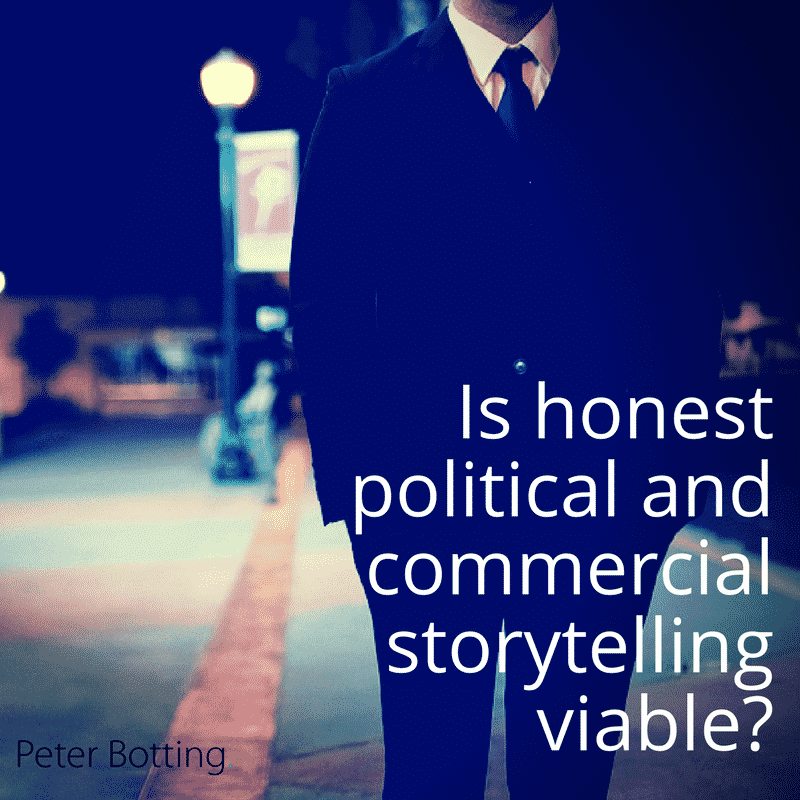Is honest political and commercial storytelling viable?
Plus a great video – essential viewing for politicos.
Voters complain that “Politicians are all the same.” Politicians mutter that they are different.
Most voters say that because politicians are seen as being out for themselves. Some voters say that politicians are too partisan. Some voters say that politicians make promises and then happily break them. Some voters, but not nearly enough, also complain about dumbed down manifestos and promises.
I think that these last two things are related. That broken promises come from dumbed down promises. I also believe that voters and politicians are complicit in this. So have the spin doctors who feed the media and (attempt to) bridge the gap between politicians and voters.
Let me explain.
It is easy to divide people into ‘goodies’ and ‘baddies’. Good guys and bad guys are the basis of every story, every film, every script and plot. Good stories need heroes and enemies. Without an enemy there is no hero and no need for a hero.
Like their political owners, manifestos or promises are also split simplistically into good and bad. Political parties do this all the time because they think they must have political ownership of a policy to gain political advantage. Which is why illogical things happen in politics – like an opposition party opposing a policy that they introduced while in government, or a governing party introducing legislation that they opposed in opposition.
In film making, professional storytelling aimed at adults, good guys can become bad guys and bad guys can become good guys. There is some complexity. A twist or two. Characters develop. In politics that is apparently too hard. Political storytelling is far less nuanced, far less grown up than fictional storytelling. Professional filmmakers and storytellers would probably grade political storytelling as equivalent to that aimed at 5-6 year olds.
Political good and bad guys and good and bad stories (aka manifestos) are generally presented as wholly good or wholly bad. Political stories are easier to tell and sell that way. The media like short messages. Absolute messages. Yes or No.
These political stories often have the same structure. What is the problem? What is the personal cost and damage? Who is to blame? Who is the hero? A bad guy and a good guy. End. Period.
But films are fiction and political manifestos should not be. They are promises that have to be implemented in real life. In real life perfection is sought but it is seldom achieved. But no-one wants to know that. So voters want heroes and good guys with good stories and manifestos. Like in the movies. Like Superman or Batman. They don’t want the nuanced message. The honest message. So politicians do what works. They tell voters what voters want to hear and what politicians want to deliver. And both feel disappointed and betrayed afterwards.
By definition, these media friendly soundbite manifestos often remain fiction. Politics is easy in opposition. Promises are easy to make. They are terribly hard to keep.
What is far worse and far more dangerous, the constant hyping up of small issues into potential ‘end of the world as we know it’ scenarios and the heightened red alert language politicians use to do this, means that if and when a real life threat to our country materialises, politicians may have ‘cried wolf’ too often.
This fictional short video is about how politics could be, if political storytelling was more honest, more grown up and did not rely on meaningless soundbites. Sadly the girl in the clip represents too many voters and activists – looking for and listening to the soundbite.
Equally sadly, too many politicians could be seen as the inspiration for the two politicians on the left and right on the stage. Far too few even slightly resemble the guy in the middle.
In the clip the journalists come alive. In the UK we have some of the best individual journalists in the world despite the recent shadow over their industry. Perhaps those individual journalists and their editors can help improve the level of political storytelling in the UK.
Of course, the political parties are complicit too. Character development and personal journeys are derided as inconsistencies and evidence of unreliability and unpredictability and probable disloyalty. Politicians are either in or out. Being tame and predictable and monochrome and consistent are sought after career building traits. Individualism and ‘unauthorized thought’ limits, damages and derails political careers.
Who would have thought that possible in our model freedom loving Western democratic world?


